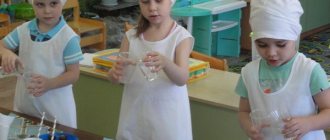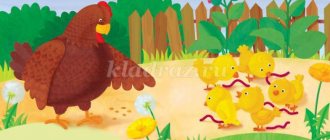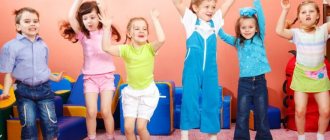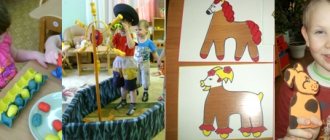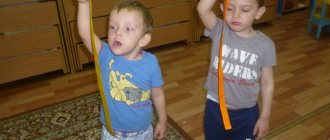Card index of communicative games (first junior group)
Alexandra Komar
Card index of communicative games (first junior group)
Communication games
for young children
Guidelines
Communication is one of the conditions for the mental development of a child. It affects the results of all the most important types of activities: study, work, play, social orientation, etc. But mainly communication has an impact on the development of the personality of children with special educational needs, promotes their socialization and integration into a peer group . At the same time, it is not an innate activity. Therefore, only through specially organized training and education can significant success be achieved in the development of communication.
At the age of 2-3 years, communication with peers becomes increasingly important. This is due to the fact that meaningful communication between peers arises on equal terms, therefore:
- children strive to interest themselves and attract the attention of peers;
- respond sensitively to any action of a peer;
It is from the moment when interest in another child begins to show that children need to be taught to communicate with each other.
For the purpose of communication between children, an adult:
- helps the child see a person in a peer;
— organizes joint games for children;
— teaches friendly communication;
- encourages attracting attention to peers, calling by name, affectionate words, etc.
Let's consider several options for games aimed at developing communication skills in young children. The proposed games can be used in working with children with special educational needs.
Game "Tender name"
Goal: learn to interact with each other, say the name of another child.
Children stand in a circle, each of them takes turns entering the center. All other children, with the help of an adult, name variations of the affectionate name of the child standing in the center of the circle.
Game “Who came to visit us?”
Goal: to promote the development of self-esteem in children; activate children's friendly attitude towards their peers.
the group aside and agrees with them that they will portray animals that will come to visit the children. Children decide which animals they will portray. Children stand in a circle. The guests take turns entering the circle. The adult says to the children: “Look what a wonderful animal has come to us, what eyes it has, how beautifully it moves, etc.” Children need to guess what animals came to them and what mood they were in.
A game «»
The bird's wing hurts"
Goal: to promote in children the ability to love others.
One of the children turns into a bird whose wing hurts. He tries to show that he is sad. The presenter invites the children to “feel sorry for the bird”
.
The first to “pity”
her is the presenter himself, who puts a kitten doll on his hand and strokes
the “bird”
with the words: “Bird...
(Sasha, Masha)
is good.”
Then other children put on the kitten doll and also “feel sorry for the bird
.
Game "Let's play together"
Goal: teach children to interact and treat each other politely.
Equipment: paired toys (ball-groove, train-car, cube machine)
.
An adult distributes toys to children, places children in pairs, and invites them to play together. Then he helps each of the children perform object-based play actions in accordance with the purpose of each toy. At the end of the game, the adult records who played with whom, calling each child by name: “Anya played with Dasha - they rolled a ball, Dima played with Vasya - they drove a train, Petya played with Lena - they loaded and carried cubes in the car.”
Game "Our Sun"
Goal: to promote the unification and interaction of children in the group .
An adult draws a circle on whatman paper. Then he outlines the palms of the children, thus creating rays of the sun. With the help of an adult, children color the drawn palms. The result is a beautiful multi-colored sun, which is hung in a group .
The game “who can wake you up better”
Goal: to promote in children the ability to love others.
One child turns into a cat and falls asleep - lie down on the rug in the center of the group . The presenter asks to take turns waking up the “sleeping cat”
.
It is advisable to do this in different ways (with different words and touches, but each time affectionately. At the end of the exercise, the children all decide together who “woke up the kitty”
most affectionately.
Game “I’ll show you how much I love”
Goal: to promote in children the ability to love others.
An adult says that you can show a person that you love him only with touches, without words. Then one of the guys turns into his mother, the other into her
Son, and show how much they love each other. The next couple is “mother”
and
“daughter”
, then
“grandmother”
and
“grandson”
, etc.
Game "A leaf is falling"
Goal: develop the ability to collaborate.
An adult raises a sheet of paper above the table (at a distance of about a meter, then lowers it and draws the children’s attention to how smoothly it falls down and lies on the table. After this, the presenter asks the children to turn their hands into pieces of paper. The presenter again raises the sheet of paper - children raise their hands up. The adult lowers the sheet, it goes down to the table. Children need to do the same, that is, smoothly lower their hands onto the table at the same time as the sheet of paper. The exercise can be repeated several times. The presenter emphasizes the children’s ability to act in concert, together.
Game “I can’t be offended, oh, I laugh, I crow!”
Goal: to help reduce resentment in children.
One child sits on the “magic chair”
, the other should pretend to offend him. The adult begins to say the words:
“I can’t be offended...”
- the child continues:
“Oh, I’m laughing, I’m crowing!”
Game "Animal Piano"
Goal: to develop children's ability to cooperate.
Children squat in one line. They are piano keys that sound like the voices of different animals. The presenter gives the children cards with images of animals whose voices will sound “keys”
(cat, dog, pig, mouse, etc.)
Then the adult touches the children’s heads, as if pressing keys. The keys need to sound like the voices of the corresponding animals.
Game "Locomotive"
Goal: to teach the child to respond to his name, remember the names of peers, and act according to demonstration and verbal instructions.
The adult explains to the children that now they will play train. The main locomotive will be the adult, and the children will be the carriages. He calls the children one by one, emotionally commenting on what is happening : “I will be the locomotive, and you will be the carriages. “Petya, come to me, stand behind me, hold my belt, like this. Now Vanya, come here, stand behind Petya, hold him by the belt,” After all the children lined up, “train”
hits the road.
An adult, imitating the movement of a steam locomotive “Chuk-chukh, oo-oo-oo!”
encourages children to repeat them.
Game "Pass the Ball"
Goal: learn to interact with peers.
Children stand opposite each other. An adult, showing children how to correctly hold and pass the ball to another child, calling him by name ( “Here, Petya!”
).
The game is emotionally supported by an adult.
Game "Affectionate Child"
Goal: continue to teach children to imitate emotional, tactile and verbal ways of interacting with a partner.
Children sit on chairs in a semicircle in front of an adult. He calls one of the children to him and shows how to hug him, lean against him, look into his eyes, and smile. “Oh, how good Sasha is, come to me, I’ll hug you, like that.
Look, kids, how I hug Sasha, like this. I'm affectionate! Then the adult invites another child to his place and invites him to repeat all his actions, emotionally emphasizing each child’s action and, if necessary, providing him with help. At the end of the game, the adult emphasizes and sums up all the child’s actions: “Vanya hugged Sasha, looked into his eyes, and smiled. That’s what Vanya is, an affectionate child!” Then the adult calls the remaining children one by one and the game is repeated.
Long-term thematic planning “Social and communicative development” for junior group 2
Long-term thematic planning
educational field "Social and communicative development"
for children of the 2nd junior group
Ukrainian Olena Vladimirovna,
deputy head,
MADO "Malvina"
Noyabrsk, Yamal-Nenets Autonomous Okrug
Main goals and objectives:
Socialization, development of communication, moral education. Mastering the norms and values accepted in society, nurturing the child’s moral and ethical qualities, developing the ability to correctly evaluate one’s own actions and the actions of peers. Development of communication and interaction of the child with adults and peers, development of social and emotional intelligence, emotional responsiveness, empathy, respectful and friendly attitude towards others. Forming children’s readiness for joint activities, developing the ability to negotiate, independently resolve conflicts with peers; developing the child’s self-image and basic skills for building an adequate system of positive personal assessments and a positive attitude towards himself; formation of the prerequisites and foundations of an ecological worldview, moral attitude towards positive national traditions and universal human values; formation of skills to use verbal means of communication in conditions of their adequate combination with non-verbal means in the context of various types of children's activities and in free communication.
Child in family and community, patriotic education. Formation of self-image, respectful attitude and sense of belonging to one’s family and to the community of children and adults in the organization; formation of gender, family, citizenship; nurturing love for the Motherland, pride in its achievements, and patriotic feelings.
Self-service, independence, labor education. Development of self-service skills; the formation of independence, purposefulness and self-regulation of one’s own actions. Education of cultural and hygienic skills. Formation of positive attitudes towards various types of work and creativity, nurturing a positive attitude towards work and the desire to work. Fostering a value-based attitude towards one’s own work, the work of other people and its results. Formation of the ability to responsibly relate to the assigned task (the ability and desire to complete the task, the desire to do it well). Formation of primary ideas about the work of adults, its role in society and the life of each person; developing the ability to cooperate with adults and peers; adequately perceive surrounding objects and phenomena, have a positive attitude towards them.
Formation of security fundamentals. Formation of primary ideas about safe behavior in everyday life, society, and nature. Fostering a conscious attitude towards compliance with safety rules. Formation of a cautious and prudent attitude towards situations that are potentially dangerous for humans and the surrounding natural world. Formation of ideas about some typical dangerous situations and methods of behavior in them. Formation of basic ideas about road safety rules; fostering a conscious attitude towards the need to comply with these rules.
September “GOODBYE, SUMMER!” “HELLO, KINDERGARTEN!”
| Topic of the week | Kindergarten. Toys | Harvest (vegetables) coming from the field | What grows in the garden? (fruits) | Autumn the artist |
| Socialization, development of communication, moral education | Game discussion “The doll Dasha came to kindergarten” | Game discussion “Remembering the names of our friends” | Game discussion “Our good deeds” | Game discussion “Tanya the doll is visiting us” |
| Child in family and community, patriotic education Self image Family Kindergarten Home country | Game situation "How the cube lost its family" | Game situation “Cipollino’s story about his family” | Game situation "We're putting away the toys" | Game situation “How Ira and Anya didn’t share the toy” |
| Self-service, independence, labor education Cultural and hygienic skills Self-service Socially useful work Labor in nature Respect for the work of adults | Game interaction “Let’s show Mishka a corner of nature” | Game interaction “How a hat quarreled with a jacket in the closet” | Game interaction "Masha is having lunch" | Game interaction “Water, water, wash my face” |
| Forming the foundations of security Safe behavior in nature Road safety Personal safety | Conversation “How the Kitten almost got burned at lunch” | Conversation “What is a traffic light for, what do the colors of the traffic light mean?” | Conversation “Things that cannot be taken without adult permission” | Conversation “How the boy Kostya helped an unknown girl find her way home” |
October “IN THE WORLD OF NATURE”
| Topic of the week | Migratory birds | What grows in the forest? (mushrooms) | Gifts of the forest (berries) | Trees in autumn |
| Socialization, development of communication, moral education | Game discussion "Let's never quarrel" | Game discussion “What can I be praised for?” | Game discussion “How Baby Camel learned polite words” | Game discussion “Kitten and Puppy – friends since childhood” |
| Child in family and community, patriotic education Self image Family Kindergarten Home country | Game situation "We're putting away the toys" | Game situation "Mushroom Family" | Game situation “New doll in our corner” | Game situation “What you can do to please adults” |
| Self-service, independence, labor education Cultural and hygienic skills Self-service Socially useful work Labor in nature Respect for the work of adults | Game interaction “Friends of Moidodyr live in our group” | Game interaction “Let’s dress the doll for a walk” | Game interaction “What did we do with the table crumbs?” | Game interaction “Welcoming guests” (table setting) |
| Forming the foundations of security Safe behavior in nature Road safety Personal safety | Conversation “It’s icy outside!” | Conversation “A beautiful toadstool grew up in a forest clearing” | Conversation “This berry is delicious, but this one is dangerous” | Conversation “How the bunnies got lost in the forest” |
November “LATE AUTUMN”
| Topic of the week | At grandma's in the village (Pets) | At grandma's in the village (poultry) | Who lives in the forest? (animals of Russia) | Who lives in the forest? (animals of Africa and Antarctica) |
| Socialization, development of communication, moral education | Game discussion “Why is Donkey sad?” | Game discussion "How the animals divided the orange" | Game discussion “Let’s find a friend for the bunny” | Game discussion “How Mishutka talked to Mikhail Ivanovich on the phone” |
| Child in family and community, patriotic education Self image Family Kindergarten Home country | Game situation “How the Calf Forgot to Call the Adults” | Game situation “How a turkey settled in the poultry yard” | Game situation “How the boar came to the home yard” | Game situation "How we went to the zoo" |
| Self-service, independence, labor education Cultural and hygienic skills Self-service Socially useful work Labor in nature Respect for the work of adults | Game interaction “What should we do with wet felt boots?” | Game interaction “At the table” | Game interaction “How a candy wrapper, an insert and a stub settled in the cabinet” | Game interaction “Let’s teach Cheburashka to set the table correctly and beautifully” |
| Forming the foundations of security Safe behavior in nature Road safety Personal safety | Conversation “How the Little Goat got scared of thunder” | Conversation “How ducklings taught chickens to swim” | Conversation “Forest School of Road Safety Rules” | Conversation “What the truck told us” |
December “NEW YEAR’S LACE”
| Topic of the week | Hello, winter-winter! | Wintering birds | Winter forest. Trees. | New Year's carnival |
| Socialization, development of communication, moral education | Game discussion “What do they call you?” | Game discussion “How we guessed our moods” | Game discussion “How Pinocchio became polite” | Game discussion “How I looked for a gift for my friend” |
| Child in family and community, patriotic education Self image Family Kindergarten Home country | Game situation “Every toy has its place” | Game situation “Like a titmouse knocked on our window” | Game situation “How the bunny made friends with the Christmas tree” | Game situation “New Year in a doll’s corner” |
| Self-service, independence, labor education Cultural and hygienic skills Self-service Socially useful work Labor in nature Respect for the work of adults | Game interaction “Getting dressed for a winter walk” | Game interaction “Why did all the toys leave the group?” | Game interaction “Let’s help the dolls set the table” | Game interaction “How the animals decorated the Christmas tree” |
| Forming the foundations of security Safe behavior in nature Road safety Personal safety | Conversation “What did Pinocchio mess up about the traffic rules?” | Conversation “Visiting Doctor Aibolit” | Conversation “How Murzik taught road signs” | Conversation “How Petya and Tanya went to the toy factory” |
January “WINTER-WINTER”
| Topic of the week | Holidays | Clothes, shoes | Games in the yard |
| Socialization, development of communication, moral education | Game discussion “How we got to the land of politeness” | Game discussion “Museum of Friends and Friendship - what we saw there” | Game discussion “How Vanya met the boys in the yard” |
| Child in family and community, patriotic education Self image Family Kindergarten Home country | Game situation “How we imagined we came to kindergarten for the first time” | Game situation "Friendly family" | Game situation “How Anton fell in love with going to kindergarten” |
| Self-service, independence, labor education Cultural and hygienic skills Self-service Socially useful work Labor in nature Respect for the work of adults | Game interaction “They dropped Mishka on the floor, tore off Mishka’s paw” | Game interaction “How Masha lost her mitten” | Game interaction “Why doesn’t Seryozha go out for a walk?” |
| Forming the foundations of security Safe behavior in nature Road safety Personal safety | Conversation “How two stubborn cars did not want to give way” | Conversation “If you don’t want to get sick” | Conversation “How Valya and Masha sledded” |
February “DEFENDERS OF THE FATHERLAND”
| Topic of the week | Let's go, fly, sail (land transport, modes of transport, transport professions) | Let's go, fly, sail (water and air transport, types of transport, professions in transport) | I will serve in the Army | My friend Svetoforich (Traffic Laws) |
| Socialization, development of communication, moral education | Game discussion “How Ivanushka wanted to do a good deed” | Game discussion “Why did Petya frown?” | Game discussion “A good word heals, but a bad word cripples” | Game discussion “Uncle Styopa is a policeman visiting us” |
| Child in family and community, patriotic education Self image Family Kindergarten Home country | Game situation "I'm with my dad at the car shop" | Game situation “I’m helping my dad fix his car.” | Game situation “Dad and I are very similar” | Game situation “How Vintik and Shpuntik organized a hospital for cars” |
| Self-service, independence, labor education Cultural and hygienic skills Self-service Socially useful work Labor in nature Respect for the work of adults | Game interaction “Why did the cubes disappear?” | Game interaction "Letter from a Dirty Man" | Game interaction “Where should I put the crumbs from the table?” | Game interaction “Why was Doctor Aibolit upset?” |
| Forming the foundations of security Safe behavior in nature Road safety Personal safety | Conversation “We are going to the workshop where cars are made” | Conversation “What the bus told the car” | Conversation “We are in a city of pedestrians” | Conversation “How many eyes does a traffic light have?” |
March "SPRING-BEAUTY"
| Topic of the week | Spring | Mother's day. Family | Dishes. Food | Furniture. Appliances |
| Socialization, development of communication, moral education | Game discussion “Magic words - why are they magic?” | Game discussion “Gift for my beloved mother” | Game discussion “How to please your friend?” | Game discussion “Vanya’s good deed” |
| Child in family and community, patriotic education Self image Family Kindergarten Home country | Game situation “We are going to visit” | Game situation “How Dad and I Helped Mom” | Game situation “How we go to a self-service store” | Game situation “How Vova and Dad bought a TV” |
| Self-service, independence, labor education Cultural and hygienic skills Self-service Socially useful work Labor in nature Respect for the work of adults | Game interaction “Why does Fenechka have rosy cheeks” | Game interaction "Visiting Queen Comb" | Game interaction “The pony horse welcomes guests” (table setting) | Game interaction “Let’s show Pinocchio how we dress properly for a walk” |
| Forming the foundations of security Safe behavior in nature Road safety Personal safety | Conversation “What tires saw on the road” | Conversation “Why do children grow bumps on their foreheads” | Conversation “Why does a policeman need a control stick?” | Conversation “What is in Aibolit’s suitcase?” |
April “EARTH IS OUR COMMON HOME”
| Topic of the week | Corner of nature | Heaven and earth are friends | Motherland | Our town |
| Socialization, development of communication, moral education | Game discussion “Why did Piggy and Karkusha quarrel?” | Game discussion “How Natasha met her neighbors” | Game discussion “Why does Olga Pavlovna always smile?” | Game discussion “We are visiting the Fairy of Toy Town” |
| Child in family and community, patriotic education Self image Family Kindergarten Home country | Game situation “Dad and I made a birdhouse” | Game situation “Baby and Carlson came to kindergarten” | Game situation “Forest kindergarten” | Game situation “We are walking around the city with dad” |
| Self-service, independence, labor education Cultural and hygienic skills Self-service Socially useful work Labor in nature Respect for the work of adults | Game interaction “1,2,3 – get ready for a walk!” | Game interaction “Cleaning, tidying up, cleaning up” | Game interaction “How Moidodyr gave Vanya soap” | Game interaction “How Filya helped clean up the yard” |
| Forming the foundations of security Safe behavior in nature Road safety Personal safety | Conversation “Zaykino football field near the road” | Conversation “The iron’s story about the fire” | Conversation “How the train from Romashkino traveled around the country” | Conversation “Piggy visiting the firefighters” |
May “I REMEMBER, I AM PROUD!” "HELLO SUMMER!"
| Topic of the week | At the parade with grandpa | Flower garden on the windowsill | Not a speck, not a speck of dust | On the threshold of summer (summer, insects) |
| Socialization, development of communication, moral education | Game discussion "Who are your neighbors?" | Game discussion “Pinocchio learns the culture of behavior at a party” | Game discussion "Don't hurt your friend" | Game discussion “Who is the most polite?” |
| Child in family and community, patriotic education Self image Family Kindergarten Home country | Game situation “Like a chicken, Petya wanted to be just like dad” | Game situation “We’re going to grandma’s” | Game situation “Let’s help Katya the doll greet guests” | Game situation “How children decided to become adults in kindergarten” |
| Self-service, independence, labor education Cultural and hygienic skills Self-service Socially useful work Labor in nature Respect for the work of adults | Game interaction “Zamarashka came to us” | Game interaction “How a watering can made friends with flowers” | Game interaction “How we cleaned our site” | Game interaction “How Petya decided to decorate his yard” |
| Forming the foundations of security Safe behavior in nature Road safety Personal safety | Conversation “How Dunno wanted to become a driver” | Conversation “How fire disliked water” | Conversation “What the Traffic Light Told Us About” | Conversation “How the guys saved the grass from the fire” |
